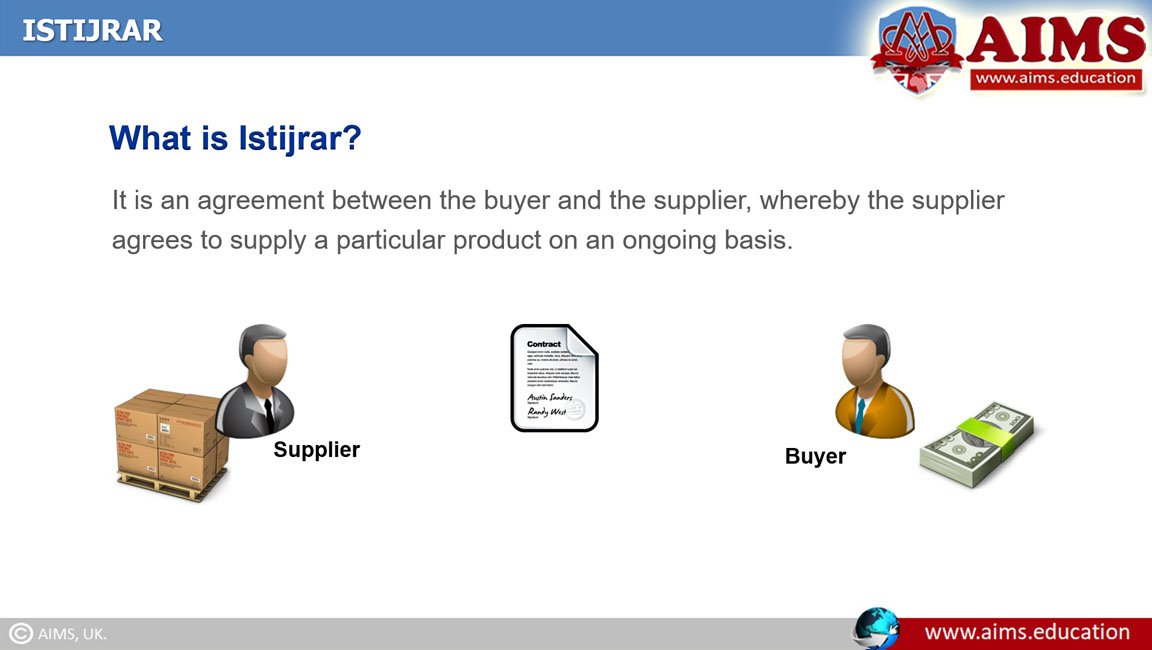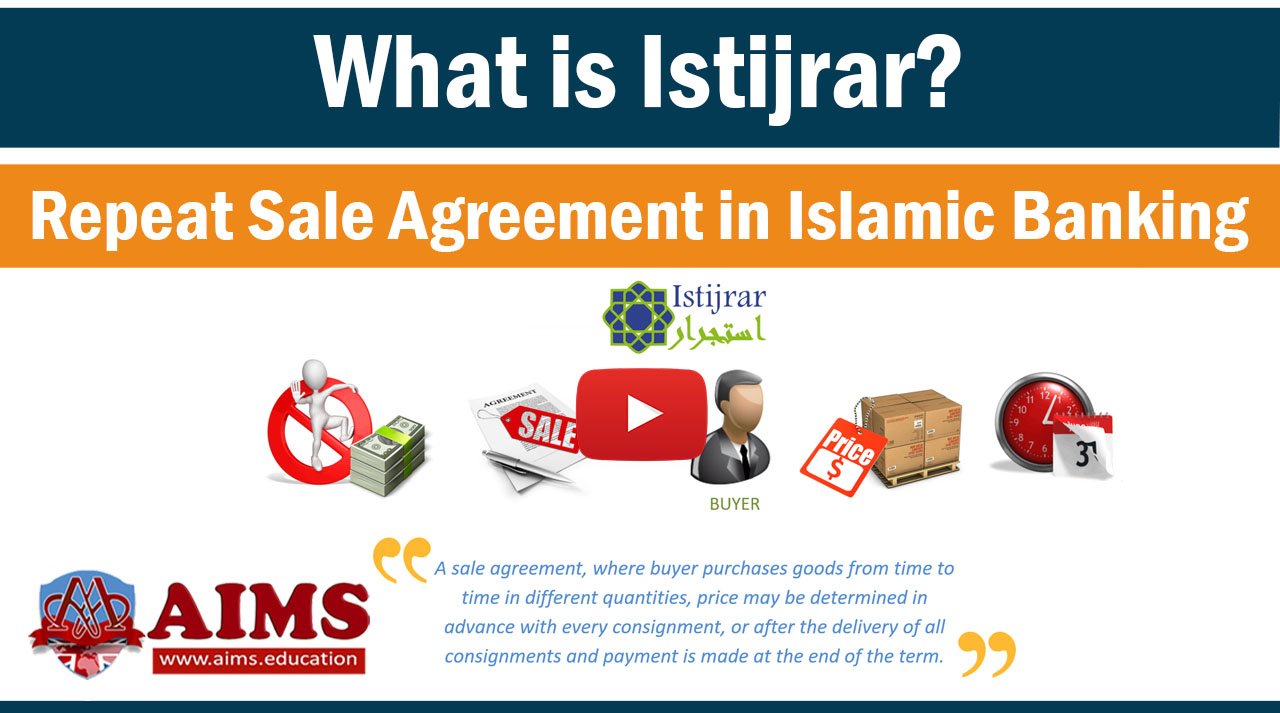What is Istijrar?
Bai Istijrar (اِستِجرار) is a Shariah-compliant repeat Sale Agreement in which a buyer purchases goods from a seller in different quantities over time, and the payment is made at the end of the term. In Istijrar, each transaction does not require a new offer, acceptance, or bargaining. In Islamic banking and finance, a master agreement is signed, where all terms and conditions are established in advance.
Price Payment and Fixation in Istijrar Contract
Under the contract of Istijrar, the buyer acquires varying quantities of a commodity from a single seller over a specific period of time. The seller delivers the total quantity in installments. In Istijrar, scholars have different views regarding the timing of price fixation and payment. These views are given below:
- Some scholars allow flexibility regarding price determination and payment timelines.
- Payment in Bai Istijrar may be deferred to a future date and based on the normal or average market price.

Types of Istijrar
There are two main types of Istijrar, which are based on how the price is determined. They are Spot Pricing and Pre-Agreed Sale:
1. Spot Pricing
In this scenario, the price is determined at the time of each transaction or after all purchases are completed. This type is permissible under the following three conditions:
i. Disclosure of Price in Spot Pricing
- The seller must disclose the price of goods during each transaction.
- The sale is valid only when the buyer possesses the goods.
- Payment is made after all transactions have been completed.
ii. Market Value Knowledge
- If the seller does not disclose the price each time, the contractors must know that the goods are sold at market value.
- The market value should be defined to prevent disputes.
iii. Deferred Pricing
- If the price is unknown at the time of possession, and the contractors agree to whatever price will be, the sale is executed.
- However, significant price differences at the time of possession may invalidate the sale.
- Upon payment, the buyer’s usage of the goods is valid from the time of possession.
In spot pricing, the following conditions are to be taken into account:
- The validity of sale correlates with possession.
- The buyer’s ownership is established from the time of possession.
- There are several Islamic financial instruments in which Islamic banks are involved. Four of them are Morabaha. Ijarah (Islamic Lease), Mudarabah contract, and Musharakah or Shirkah.
However, Istijrar is applicable only in the Murabaha contract, specifically for sellers/suppliers.
2. Pre-Agreed Sale
This type is used with the customer’s suppliers. This is how it works:
Step 1: The bank enters a Purchase Agreement with suppliers to buy assets at market price or a predetermined discount.
Step 2: For new customers, the bank performs the following task:
- Purchases assets from suppliers.
- Sells them to customers based on Morabaha.
In this type, the customer may purchase the assets over time rather than all at once, completing the purchase within a specified period. This type of Istijrar is also termed as Istijrar with Pre-agreed Sale, as the asset prices are known beforehand. Scholars agree that this is equivalent to Bai-Ta’ati.

Istijrar in Islamic Banking and Finance
In Islamic Banking and Finance, Istijrar is primarily utilized for financing working capital through repeat purchases from suppliers.
Example of Istijrar
A company named MRrB Textiles frequently purchases raw cotton from a supplier every week to meet its production needs. Instead of creating a new contract each time, the company enters into an Istijrar agreement with an Islamic bank.
Application of Istijrar in Islamic Banking
Step-1: Agreement Setup
The Islamic bank and MRrB Textiles agree that MRrB can purchase raw cotton on credit repeatedly over a certain period (e.g., 6 months), up to a certain limit (say, $100,000).
Step-2: Ongoing Supply
MRrB continues to receive weekly shipments of cotton from the supplier, and the bank keeps a record of each delivery, quantity, and agreed price.
Step-3: Deferred Payment
At the end of each month (or agreed period), MRrB pays the bank the total amount for that month’s purchases.
Step-4: Shariah Compliance
The price and terms are pre-agreed, and no interest is charged. The bank may charge a profit margin in the price itself, which is disclosed upfront.
Istijrar in Murabaha
Istijrar can be applied in Murabaha transactions, provided the following conditions are met:
a. Rejection of Ta’ati
Bai-al-Ta’ati is a sales contract in which the purchase agreement is made without any bargain. Ta’ati is unacceptable as it indirectly leads to Riba if the bank does not take possession of the assets before selling them to customers.
b. Pre-Purchase Requirement
If Ta’ati is utilized, the bank must purchase the assets before selling them to the customer. This ensures that the bank has actual possession, not merely constructive possession.
Frequently Asked Questions
Q1: What is Istijrar in Islamic finance?
Istijrar is a repeat sale arrangement enabling multiple purchases from the same seller over time with deferred settlement under a master agreement.
Q2: What is the Istijrar meaning (Istijrar adalah)?
It’s a Shariah-compliant contract where ownership follows possession, and payment may be deferred using spot, average market, or pre-agreed pricing.
Q3: How does Bai al-Istijrar work in practice?
The buyer draws goods repeatedly within an agreed limit and period; deliveries are recorded and paid at set intervals (e.g., monthly).
Q4: What are the main Istijrar pricing types?
Spot Pricing (price set per drawdown or after all purchases) and Pre-Agreed Sale (price fixed with suppliers in advance).
Q5: What conditions apply to Spot Pricing?
Either disclose the price each time or ensure both parties know the market value; large price gaps at possession can invalidate the sale.
Q6: How does Istijrar integrate with Murabaha?
The bank pre-purchases assets from suppliers and resells to the customer on cost-plus, ensuring actual possession before resale.
Q7: Why is possession important in Bai al-Istijrar?
Sale validity and the buyer’s ownership begin at possession, ensuring clarity of rights and Shariah compliance.
Q8: What documents support an istijrar contract?
A master purchase agreement, delivery notes, invoices, and a pricing schedule or market valuation method.
Q9: When is Pre-Agreed Sale preferable?
When pricing and suppliers are stable, allowing smoother Murabaha flows and easier reconciliation than variable spot pricing.
Q10: Can you give a simple example?
A manufacturer draws raw material weekly under a limit, then settles the total monthly based on pre-agreed or market-based pricing.

